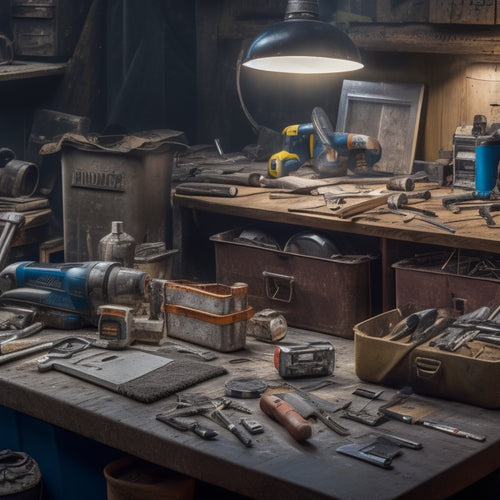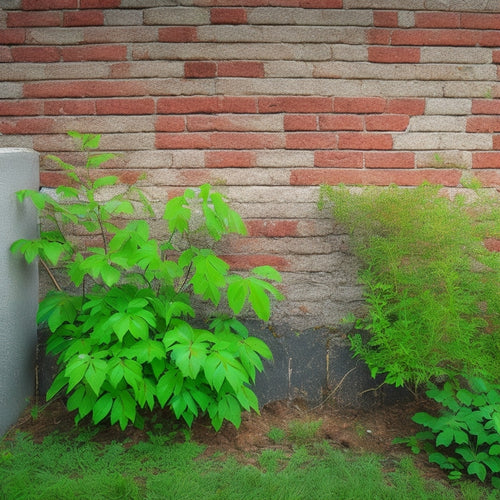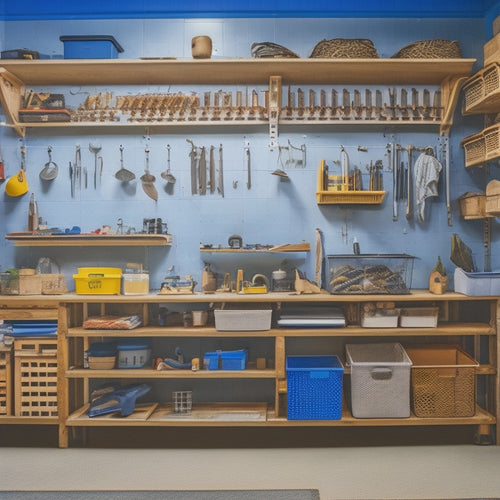
Top Tools for Small Renovation Projects
Share
You'll need a solid collection of essential tools to tackle small renovation projects efficiently and effectively. Start with concrete mixing essentials like a mixing bucket and stick, level, and dry mix. Hand tools like screwdrivers, pliers, and utility knives will help with quick fixes. For precision tasks, invest in power tools like a laser level, precision saw, and rotary hammer drill. Don't forget mixing buckets, trowels, and finishing tools for a flawless finish. Measuring and marking tools, cutting and drilling tools, sanding and smoothing tools, and cleaning and maintenance tools will also come in handy. Explore the must-haves for each category to guarantee your renovation project goes smoothly.
Key Takeaways
• Essential tools for small renovation projects include mixing buckets, hand tools, power tools, and safety equipment to ensure efficiency and accuracy.
• A sturdy mixing bucket, mixing stick, and level are must-haves for concrete mixing and other renovation tasks.
• Hand tools like screwdrivers, pliers, and utility knives are necessary for quick fixes and minor repairs.
• Power tools like laser levels, precision saws, and rotary hammer drills provide precision and efficiency in renovation tasks.
• Safety equipment like hard hats, safety glasses, and respirators protect against hazards and ensure a safe working environment.
Concrete Mixing Essentials
You'll likely need to mix concrete for your small renovation project, so it's essential to have the right tools and materials on hand.
To achieve the perfect mix, you'll need a few fundamental items, including a mixing bucket, a mixing stick or trowel, and a level.
When it comes to concrete mixing techniques, it's all about getting the right consistency. Start by adding the recommended amount of water to the mix, then gradually add more as needed. Aim for a thick, but still pourable, consistency.
Mixing consistency tips include using a consistent mixing pattern, such as a figure-eight motion, and scraping the sides and bottom of the bucket to guarantee all ingredients are well incorporated.
Remember to mix in small batches to avoid over-mixing, which can lead to a weak final product.
Hand Tools for Quick Fixes
Equipped with the right hand tools, you can tackle minor repairs and quick fixes that inevitably arise during your small renovation project. Having the right tools at your disposal can save you time, money, and frustration.
Here are some essential hand tools you should consider having in your toolkit:
-
A screwdriver selection that includes flathead, Phillips, and Torx drivers to cover various screw types.
-
Pliers usage is vital for gripping and twisting objects, so consider having needle-nose, slip-joint, and locking pliers.
-
A tape measure for accurate measurements and a level to guarantee straight lines and balanced surfaces.
- A utility knife for cutting various materials, such as drywall, carpet, or roofing.
With these hand tools, you'll be well-equipped to handle minor repairs and quick fixes that come up during your small renovation project.
Power Tools for Precision
When minor repairs turn into more substantial tasks, power tools become the game-changer for precision and efficiency in your small renovation project. You'll need tools that can handle more complex tasks with accuracy and speed.
A laser level is a must-have for ensuring straight lines and perfect angles. This tool projects a level line or dot onto your work surface, allowing you to make precise measurements and adjustments.
For cutting tasks, a precision saw is essential. This saw provides accurate cuts with minimal waste, making it perfect for trimming, ripping, or cross-cutting materials. With a precision saw, you can make precise angled cuts, bevels, and miters with ease.
Additionally, consider investing in a rotary hammer drill or an impact driver for drilling and driving tasks. These tools provide the power and control you need to tackle demanding projects.
Mixing Bucket and Accessories
When it comes to mixing materials for your small renovation project, you'll need a reliable mixing bucket and the right accessories to get the job done.
You'll want to choose a bucket that's the right size for your project, and don't forget to grab the essential mixing tools you'll need to get started.
Bucket Size Options
You'll need a mixing bucket that's the right size for your small renovation project, and options range from compact 1-gallon containers to larger 5-gallon buckets.
When choosing a bucket, evaluate the scale of your project and the amount of material you'll need to mix. A larger bucket may be ideal for bigger projects, but it can be cumbersome and heavy when filled.
Here are some key factors to evaluate when selecting a mixing bucket:
-
Bucket capacity considerations: Think about the volume of material you'll need to mix and choose a bucket that can handle it. A 1-gallon bucket is perfect for small tasks, while a 5-gallon bucket is better suited for larger projects.
-
Ideal bucket materials: Look for buckets made from durable, easy-to-clean materials like polyethylene or stainless steel. Avoid buckets with rough surfaces or porous materials that can contaminate your mix.
-
Portability: If you'll be moving the bucket around the job site, evaluate a smaller, lighter option with a comfortable handle.
- Cost and value: Balance the cost of the bucket with its quality and durability. A cheap bucket may not be the best value if it breaks or wears out quickly.
Essential Mixing Tools
With your mixing bucket selected, it's time to gather the necessary accessories to make the mixing process efficient and effective.
You'll need a sturdy mixing stick or trowel to combine materials thoroughly. Contemplate a stick with a comfortable grip and a trowel with a notched edge for better material control. A mixing paddle or drill attachment can also be a valuable addition, especially for larger projects or when working with thick materials.
When it comes to mixing techniques, it's vital to reflect on the material you're working with. For example, when mixing concrete, it's important to follow a specific ratio of water to mix to avoid weakening the final product.
Material considerations, such as the type of aggregate or admixtures, can also impact the final result. By having the right accessories and understanding the mixing techniques and material considerations, you'll be able to achieve a consistent, high-quality mix that meets your project's requirements.
Trowels and Finishing Tools
Grab a sturdy trowel to apply and smooth out materials like joint compound, plaster, or adhesive, ensuring a professional finish for your small renovation project.
When it comes to trowels, you'll find various types suited for specific tasks. For instance, a notched trowel is perfect for applying adhesives, while a putty knife is ideal for scraping and smoothing out surfaces.
To achieve a flawless finish, it's important to master different finishing techniques. Here are some must-haves for your toolkit:
-
A putty knife for scraping and smoothing surfaces
-
A hawk for holding and transferring material to your trowel
-
A finishing trowel for creating a smooth, even finish
- A grout float for applying and smoothing grout between tiles
Safety Equipment and Gear
Protect yourself from potential hazards by investing in essential safety equipment and gear for your small renovation project.
You'll be working with power tools, handling heavy materials, and exposing yourself to potential dangers like dust, debris, and electrical shock. Don't take any chances – make personal protection a top priority.
Start with the basics: safety glasses, gloves, and a dust mask. These will shield you from flying particles, sharp edges, and airborne contaminants.
A hard hat and steel-toed boots are also must-haves for any renovation project. They'll protect your head and feet from falling objects and heavy impacts.
Don't forget about respiratory protection. A respirator or mask with a HEPA filter will keep you safe from airborne toxins and allergens.
And if you're working with chemicals or hazardous materials, be sure to wear a face shield and protective clothing.
Measuring and Marking Tools
You'll need accurate measurements and clear markings to secure a successful renovation, so invest in a set of reliable measuring and marking tools. These tools will help you avoid costly mistakes and guarantee your project turns out as planned.
Here are the essential measuring and marking tools you should have in your toolkit:
-
Tape measures: A 25-foot tape measure is a good starting point, but consider investing in a longer one (30-foot or 50-foot) for larger projects.
-
Chalk lines: Perfect for marking straight lines on walls, floors, or ceilings. Look for a chalk line with a sturdy reel and a reliable locking mechanism.
-
Level: A level guarantees your shelves, cabinets, and other installations are perfectly horizontal or vertical. You can opt for a bubble level or a laser level, depending on your budget and preference.
- Marking gauge: A marking gauge helps you make precise markings on wood or other materials. It's especially useful for repetitive tasks, like marking studs or joists.
Cutting and Drilling Tools
With precise cuts and holes, your renovation project takes shape, and that's where cutting and drilling tools come into play.
You'll need a reliable set of cutting tools to make accurate cuts in various materials. A good quality Utility Knife is a must-have for general-purpose cutting, while a Miter Saw or Circular Saw will help you make precise angled cuts in wood.
For drilling, a Cordless Drill is a versatile and convenient option. It's vital to master various cutting techniques, such as cross-cutting, rip-cutting, and miter-cutting, to achieve professional-looking results.
When it comes to drilling methods, you'll need to choose the right drill bit for the material you're working with. For instance, a Twist Bit is ideal for drilling holes in wood and metal, while a Masonry Bit is perfect for concrete and brick.
Sanding and Smoothing Tools
Once you've made the cuts and holes, it's time to smooth out the rough edges and surfaces, and that's where sanding and smoothing tools come into play. These tools will help you achieve a professional-looking finish, making your renovation project stand out.
To master sanding techniques and achieve smoothing finishes, you'll need the right tools for the job. Here are some essentials to add to your toolkit:
-
Orbital sander: Perfect for smoothing out large surfaces, orbital sanders are a must-have for any renovation project.
-
Belt sander: Great for sanding large, flat areas, belt sanders are ideal for removing old finishes or sanding down rough wood.
-
Hand sander: For smaller, more detailed work, hand sanders are perfect for getting into tight spaces and smoothing out edges.
- Sandpaper: Don't forget to stock up on various grits of sandpaper to tackle different sanding tasks, from coarse to fine.
With these sanding and smoothing tools in your arsenal, you'll be able to achieve a flawless finish that will make your renovation project shine.
Cleaning and Maintenance Tools
Regularly cleaning up as you work helps maintain a safe and efficient workspace, and that's where cleaning and maintenance tools come into play.
You'll need a reliable vacuum cleaner to remove dust and debris, as well as a broom and dustpan for quick sweeps. A damp cloth or mop will help keep surfaces clean, and a trash can with a lid will keep your workspace organized.
When it comes to cleaning techniques, you should prioritize dusting and wiping down surfaces regularly to prevent buildup. Create a maintenance schedule to guarantee you're staying on top of cleaning tasks, and adjust it as needed based on the project's progression.
Don't forget to clean your tools and equipment regularly to prevent rust and damage. A well-maintained workspace not only keeps you safe but also helps you stay focused and productive.
Frequently Asked Questions
Can I Reuse Renovation Materials From My Old Project?
When you're left with leftover materials from your old project, you're probably wondering if you can reuse them.
The answer is, it depends. If the materials are still in good condition, repurposing them can be a great way to reduce waste and save money.
You'll achieve significant cost savings by reusing materials like lumber, tiles, or plumbing fixtures.
Just make sure to inspect them carefully before incorporating them into your new project.
How Do I Dispose of Leftover Construction Waste Safely?
As you stand amidst the rubble, the remnants of your renovation project resembling a war zone, you're left wondering how to tackle the intimidating task of waste disposal.
You're not alone - construction waste disposal is a pressing concern. You'll need to explore disposal options, such as recycling facilities, landfill drop-offs, or hiring a waste management service.
Be certain to segregate hazardous materials like asbestos and lead paint, and always follow local regulations to guarantee a safe and environmentally responsible cleanup.
What Is the Best Way to Store Tools When Not in Use?
When you're not using your tools, you'll want to store them safely and efficiently.
You'll appreciate the importance of tool organization and clever storage solutions.
Consider a pegboard with hooks for hanging tools, or a portable toolbox with dividers to keep items separate.
Label each storage space so you can quickly find what you need.
This system will save you time and reduce clutter, making your next project a breeze.
Can I Renovate During Extreme Weather Conditions?
As you commence your renovation journey, the stormy weather outside may be as turbulent as your thoughts about proceeding.
Don't let the rain pour cold water on your plans! You can renovate during extreme weather conditions, but you'll need to take weather precautions seriously.
Adjust your project scheduling to accommodate the weather, securing outdoor materials and covering sensitive areas.
With careful planning, you'll be hammering away in no time, come rain or shine.
Do I Need to Hire a Professional for Electrical Work?
When tackling electrical work, you're probably wondering if you need to hire a pro.
Honestly, it's essential you take safety precautions seriously. Unless you're an experienced electrician, it's not worth risking your life. Always follow DIY guidelines and local regulations.
If you're unsure, it's better to err on the side of caution and hire a licensed electrician. They'll make certain the job is done correctly and safely, giving you peace of mind.
Conclusion
As you stand amidst the chaos of your small renovation project, remember that the right tools are your trusted allies.
With these top tools by your side, you'll conquer the mess, tame the chaos, and emerge victorious with a space that shines like new.
From mixing and measuring to cutting and drilling, each tool is a puzzle piece that fits perfectly into your renovation plan.
With this arsenal, you'll transform your space in no time!
Related Posts
-

Smart Guide to Buying Second-Hand Renovation Tools
When buying second-hand renovation tools, you'll want to set clear renovation goals and a realistic budget to priorit...
-

Why Do Cinder Block Wall Renovations Cost So Much
You're likely surprised by the high cost estimate for your cinder block wall renovation project, but it's driven by s...
-

7 Best Tool Storage Ideas for Home Renovation
When it comes to home renovation, staying organized is key to maximizing productivity and minimizing wasted time. To ...


